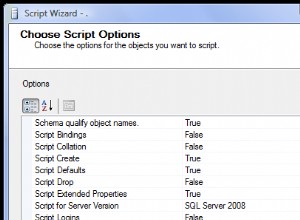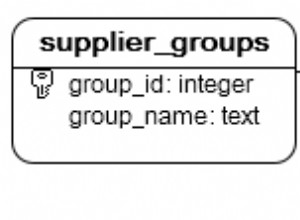Eu não acho que você pode fazer isso com um SELECT. A melhor chance é escrever uma função definida pelo usuário que retorne uma tabela com todas as palavras e então fazer SELECT DISTINCT nela.
Isenção de responsabilidade: Função dbo.Split é de https://www.sqlteam.com/forums/topic.asp?TOPIC_ID=50648
CREATE TABLE test
(
id int identity(1, 1) not null,
description varchar(50) not null
)
INSERT INTO test VALUES('The dog jumped over the fence')
INSERT INTO test VALUES('The giant tripped on the fence')
CREATE FUNCTION dbo.Split
(
@RowData nvarchar(2000),
@SplitOn nvarchar(5)
)
RETURNS @RtnValue table
(
Id int identity(1,1),
Data nvarchar(100)
)
AS
BEGIN
Declare @Cnt int
Set @Cnt = 1
While (Charindex(@SplitOn,@RowData)>0)
Begin
Insert Into @RtnValue (data)
Select
Data = ltrim(rtrim(Substring(@RowData,1,Charindex(@SplitOn,@RowData)-1)))
Set @RowData = Substring(@RowData,Charindex(@SplitOn,@RowData)+1,len(@RowData))
Set @Cnt = @Cnt + 1
End
Insert Into @RtnValue (data)
Select Data = ltrim(rtrim(@RowData))
Return
END
CREATE FUNCTION dbo.SplitAll(@SplitOn nvarchar(5))
RETURNS @RtnValue table
(
Id int identity(1,1),
Data nvarchar(100)
)
AS
BEGIN
DECLARE My_Cursor CURSOR FOR SELECT Description FROM dbo.test
DECLARE @description varchar(50)
OPEN My_Cursor
FETCH NEXT FROM My_Cursor INTO @description
WHILE @@FETCH_STATUS = 0
BEGIN
INSERT INTO @RtnValue
SELECT Data FROM dbo.Split(@description, @SplitOn)
FETCH NEXT FROM My_Cursor INTO @description
END
CLOSE My_Cursor
DEALLOCATE My_Cursor
RETURN
END
SELECT DISTINCT Data FROM dbo.SplitAll(N' ')




